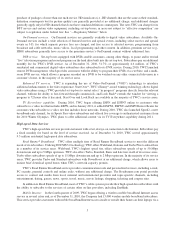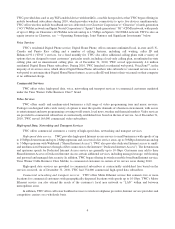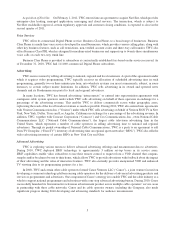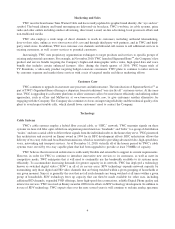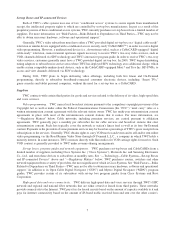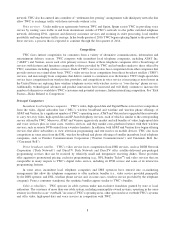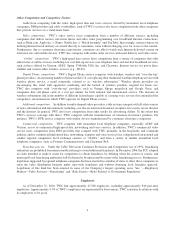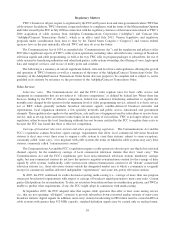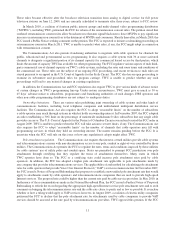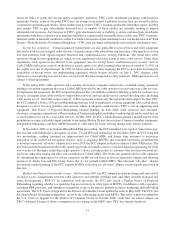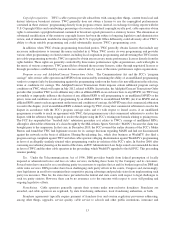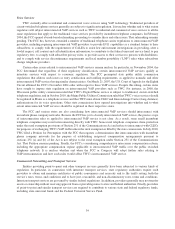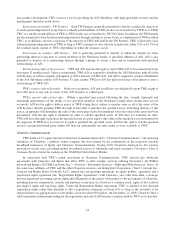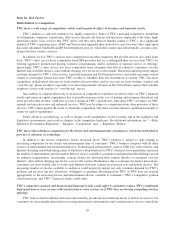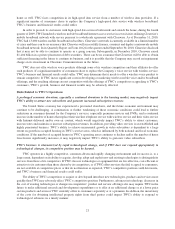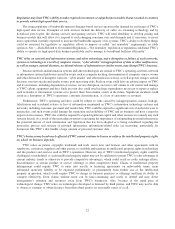Time Warner Cable 2010 Annual Report Download - page 25
Download and view the complete annual report
Please find page 25 of the 2010 Time Warner Cable annual report below. You can navigate through the pages in the report by either clicking on the pages listed below, or by using the keyword search tool below to find specific information within the annual report.Copyright regulation. TWC’s cable systems provide subscribers with, among other things, content from local and
distant television broadcast stations. TWC generally does not obtain a license to use the copyrighted performances
contained in these stations’ programming directly from program owners. Instead, in exchange for filing reports with the
U.S. Copyright Office and contributing a percentage of revenue to a federal copyright royalty pool, cable operators obtain
rights to retransmit copyrighted material contained in broadcast signals pursuant to a statutory license. The elimination or
substantial modification of this statutory copyright license has been the subject of ongoing legislative and administrative
review, and, if eliminated, modified or interpreted by the U.S. Copyright Office differently, could adversely affect TWC’s
ability to obtain suitable programming and could substantially increase TWC’s programming costs.
In addition, when TWC obtains programming from third parties, TWC generally obtains licenses that include any
necessary authorizations to transmit the music included in it. When TWC creates its own programming and provides
various other programming or related content, including local origination programming and advertising that TWC inserts
into cable-programming networks, TWC is required to obtain any necessary music performance licenses directly from the
rights holders. These rights are generally controlled by three music performance rights organizations, each with rights to
the music of various composers. TWC generally has obtained the necessary licenses, either through negotiated licenses or
through procedures established by consent decrees entered into by some of the music performance rights organizations.
Program access and Adelphia/Comcast Transactions Order. The Communications Act and the FCC’s “program
carriage” rules restrict cable operators and MVPDs from unreasonably restraining the ability of an unaffiliated programming
vendor to compete fairly by discriminating against the programming vendor on the basis of its non-affiliation in the selection,
terms or conditions for carriage. The Adelphia/Comcast Transactions Order imposes certain additional program carriage
conditions on TWC, which will expire in July 2012, related to RSNs. In particular, the Adelphia/Comcast Transactions Order
provides that (i) neither TWC nor its affiliates may offer an affiliated RSN on an exclusive basis to any MVPD; (ii) TWC may
not unduly or improperly influence the decision of any affiliated RSN to sell programming to an unaffiliated MVPD or the
prices, terms and conditions of sale of programming by an affiliated RSN to an unaffiliated MVPD; (iii) if an MVPD and an
affiliated RSN cannot reach an agreement on the terms and conditions of carriage, the MVPD may elect commercial arbitration
to resolve the dispute; (iv) if an unaffiliated RSN is denied carriage by TWC, it may elect commercial arbitration to resolve the
dispute in accordance with the FCC’s program carriage rules; and (v) with respect to leased access, if an unaffiliated
programmer is unable to reach an agreement with TWC, that programmer may elect commercial arbitration to resolve the
dispute, with the arbitrator being required to resolve the dispute using the FCC’s existing rate formula relating to pricing terms.
The FCC has suspended this “baseball style” arbitration procedure as it relates to TWC’s carriage of unaffiliated RSNs,
although it allowed the arbitration of a claim brought by the Mid-Atlantic Sports Network (“MASN”) because the claim was
brought prior to the suspension. In that case, in December 2010, the FCC reversed the earlier decision of the FCC’s Media
Bureau and found that TWC had legitimate reasons for its carriage decisions regarding MASN and had not discriminated
against the network on the basis of affiliation. Herring Broadcasting, Inc., which does business as WealthTV, also filed a
program carriage complaint against TWC and other cable operators alleging discrimination against WealthTV’s programming
in favor of an allegedly similarly situated video programming vendor in violation of the FCC’s rules. In October 2009, after
convening an evidentiary hearing on the merits of the claim, an FCC Administrative Law Judge issued a recommended decision
in favor of TWC and the other cable operators in the proceeding, which WealthTV appealed to the full FCC. This proceeding
remains pending.
Tax. Under the Telecommunications Act of 1996, DBS providers benefit from federal preemption of locally
imposed or administered taxes and fees on video services, including those borne by the Company and its customers.
Several states have enacted or are considering parity tax measures to equalize the tax and fee burden imposed on DBS and
cable video services. DBS providers have been challenging such parity efforts in the courts, Congress and, increasingly,
state legislatures in an effort to maintain their competitive pricing advantage and preclude states from implementing such
parity tax measures. Thus far, the states have prevailed in the federal and state courts with respect to legal challenges to
such tax parity statutes. However, there can be no assurance as to the outcome with respect to cases still pending and
ongoing legislative efforts.
Franchising. Cable operators generally operate their systems under non-exclusive franchises. Franchises are
awarded, and cable operators are regulated, by state franchising authorities, local franchising authorities, or both.
Franchise agreements typically require payment of franchise fees and contain regulatory provisions addressing,
among other things, upgrades, service quality, cable service to schools and other public institutions, insurance and
13


